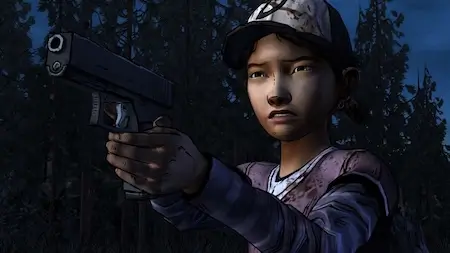Spoiler Alert: This article contains spoilers for The Wolf Among Us, The Walking Dead: Season Two, and implied spoilers for Season One.
In the early 2010s, Telltale Games became the king of episodic narrative adventures. The Walking Dead: Season One (2012) wasn’t just a game — it was a cultural moment that proved choice-driven storytelling could feel both personal and heartbreaking.
Key Takeaways
- The Wolf Among Us delivers striking noir style but suffers from low-stakes choices.
- The Walking Dead: Season Two struggles with weaker relationships and predictable decision outcomes.
- Telltale’s rapid rise and fall shows how overexpansion and formula fatigue can sink even beloved studios.
The Table of Contents
But by the time The Wolf Among Us (2013–14) and The Walking Dead: Season Two (2013–14) wrapped up, cracks in the formula were starting to show. Looking back in 2025, with Telltale’s collapse and revival now part of gaming history, these two games serve as case studies in what made the studio brilliant — and what led to its fall.
The Wolf Among Us – Stylish Noir with Shallow Choices
Set in the gritty world of the Fables comics, The Wolf Among Us boasts striking neo-noir visuals, a compelling protagonist in Bigby Wolf, and an intriguing murder mystery.
murder mystery.
Its third-person narrative perspective shapes how players connect with characters and choices, a topic we explore in our gaming perspectives article.
A huge chunk of Bigby’s decisions revolve around “how brutal are you?” moments. Do you rip off Grendel’s arm? Kill Tweedledum?
Most players opt for restraint, and there’s little consequence for taking the high road. Investigations let you pick which location to visit first, sometimes altering outcomes (like saving Prince Lawrence), but most differences feel cosmetic.
The result? End-of-episode choice stats dominated by 70–90% majorities, with very few split decisions. And many so-called “choices” are oddly toothless:
- Give a homeless kid’s present to Snow White before he’s evicted? (Who says no?)
- Offer Flycatcher a job? (Another crowd-pleaser with minimal narrative weight.)
The ending fares slightly better, with an identity twist and a crowd confrontation. But even then, credibility bends to force a pre-determined climax. The reveal is neat, but it’s disconnected from player agency. As a prequel to the comics, TWAU was always bound by canon — and it shows.
- Review aggregator Metacritic praises The Wolf Among Us for its stylish noir setting and engaging mystery, though some critics note its limited choice impact (Metacritic – The Wolf Among Us Reviews).
The Walking Dead: Season Two – Clementine’s Uneven Journey
Clementine as a protagonist was an exciting prospect, but Season Two often felt like it was coasting on the goodwill of Season One without matching its stakes.
The core problem? Too many low-risk, low-impact decisions. Examples include:
- Mercy killing a wounded dog.
- Accepting Nick’s apology.
- Giving water to a dying man.
- Helping Sarah with chores.
- Holding a baby.
- Crawling through a ticket booth for supplies (where failure just triggers a rescue).
These are fine for flavor, but when most “big” moments are this predictable, tension evaporates. Relationship stakes are also weaker. In Season One, Lee’s bond with Clementine drove every choice.
In Season Two, characters cycle in and out so fast — Luke, Christa, Nick, Rebecca, Alvin, Carlos, Sarita, Walter, Bonnie, Mike, Jane — that it’s hard to get attached. Kenny, Jane, Arvo, and a few others matter, but the emotional depth rarely matches Lee and Clem’s arc.
That said, Episode Five redeems the season with bold, dramatic choices reminiscent of Season One’s best moments. It’s proof Telltale could still deliver — but by then, much of the journey had already felt like filler.
- According to IGN, The Walking Dead: Season Two delivers another gripping chapter in Telltale’s zombie saga, though it struggles to match the emotional highs of Season One (IGN – The Walking Dead: A Telltale Game Series — Season Two).
The Rise & Fall of Telltale Games
The Walking Dead: Season One turned Telltale into an industry darling, winning Game of the Year awards and selling millions. Flush with success, the studio expanded aggressively — juggling The Wolf Among Us, The Walking Dead: Season Two, Tales from the Borderlands, Game of Thrones, Minecraft: Story Mode, Batman, and more.
But the cracks were already there:
- Overproduction split teams and saw key talent leave.
- Formula fatigue: the “illusion of choice” became too obvious.
- Technical stagnation: the aging engine limited evolution and caused performance issues.
By 2018, internal turmoil, layoffs, and financial mismanagement led to Telltale’s abrupt shutdown. The brand has since been revived under new management, with The Wolf Among Us 2 back in development — but the question remains: can they recapture Season One’s magic, or will the same structural issues resurface?
The Retro Wrap Up & Final Thoughts on TellTale Games
The Wolf Among Us and The Walking Dead: Season Two are worth revisiting in 2025 — not just as games, but as snapshots of a studio at its peak and on the edge of collapse. They showcase Telltale’s strengths in atmosphere and dialogue, but also the danger of choice systems that feel hollow.
If The Wolf Among Us 2 lands, it could be the comeback story narrative gaming needs. If not, these two titles might remain bittersweet reminders of a studio that once defined a genre — and then lost its way.
Your turn: Which Telltale game left the biggest impression on you? Did your choices truly matter — or was it all smoke and mirrors?
Turn Your Old Games into Cash
Finished playing your favorite story-driven adventures? Don’t let them gather dust! Sell your video games with The Old School Game Vault for fast quotes, trusted payments, and a hassle-free process.
Frequently Asked Questions:
Are Telltale Games still available?
- Yes. Many original Telltale titles are available on modern platforms, and the revived studio continues to re-release classics and develop new projects.
How many Telltale Games are there?
- Telltale produced over 20 narrative games and seasons, including The Walking Dead, The Wolf Among Us, Batman, and Tales from the Borderlands.
How did Telltale Games shut down?
- In 2018, Telltale closed abruptly due to financial issues, overexpansion, and project mismanagement, laying off most staff and canceling projects.
Are Telltale Games worth it?
- If you enjoy story-driven adventures with strong characters and player-choice systems, Telltale games remain engaging and worth playing.
Are Telltale Games good?
- Yes. Their best titles, like The Walking Dead Season One and The Wolf Among Us, are highly praised for storytelling and atmosphere.
Are Telltale Games on Switch?
- Several Telltale games, including Batman and The Wolf Among Us, are available on Nintendo Switch.








